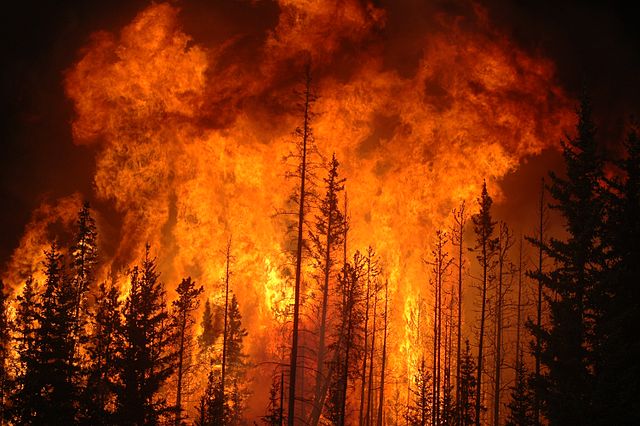Summary
Forest fires have both awful and wonderful effects with respect to wild-animal suffering. Bad effects include killing many animals (sometimes in excruciating ways) and possibly spurring increased plant growth. A substantial good effect of forest fires is that they eliminate huge amounts of stored plant food that would otherwise have created tons of new animals.
Contents
Bad effects of forest fires
Painful wildlife deaths
 Burning alive is among the worst possible deaths. An animal that burns to death plausibly experiences a few times more pain than an animal dying in another way. This section includes some videos of burning bugs to help assess how bad burning deaths are.
Burning alive is among the worst possible deaths. An animal that burns to death plausibly experiences a few times more pain than an animal dying in another way. This section includes some videos of burning bugs to help assess how bad burning deaths are.
That said, not all animals caught in forest fires burn alive. When people are burned at the stake with big fires, they die by asphyxiation rather than heat. A similar observation may apply to fires in the home, although inhaling extremely hot smoke is probably pretty painful in its own right: "A fully-developed indoor fire can reach or exceed temperatures of 1100 degrees Fahrenheit. Even one breath of this very hot air can be lethal."
This article quotes one expert as saying regarding the 2016 Fort McMurray wildfire: "There’s wildlife that are going to be just incinerated." And:
After fires in southwestern Alberta in 2002, which occurred long after breeding season, the Alberta Birds of Prey Society received about 10 great-horned owls to its clinic. “Their feathers had been singed off, and their skin was burnt,” says Weir.
The article explains that while some animals are able to escape in time, others cannot:
smaller birds that fly at lower altitudes can die of smoke inhalation or exhaustion. [...]
As for small mammals, a porcupine’s first response in the face of danger is to climb up trees. “That’s not overly useful in this situation,” says Zimmerling. “They’re not overly mobile.” Squirrels scurry to the very top branches, while burrowing animals can die if they don’t dig deep enough. “We may end up with animals cooking in the burrows unfortunately,” says Zimmerling. Mark Heathcott, a firefighter of 23 years in Banff National Park, recalls finding the body of a wolf that died during a controlled burn. “She panicked and tried to return to her den,” Heathcott says.
Stimulating plant growth
Some forests regenerate with fire. This article claims that "Many scientists point out that [...] while in the short term these wildfires destroy trees, wildlife, and their habitats, in the long run wildfires help create enriched soil, greater biodiversity, and the greater overall health of a forest."
This article reports:
Forests naturally burn, usually every 10 to 100 years, and the affected area will invite more sunlight, new grass and berry-producing bushes. “I can guarantee within days, you’ll see animals moving back to the same area looking for fresh vegetation,” says Zimmerling. “You’ll see a bump in numbers of deer and other ungulates. You’ll see an actual explosion of the moose population because there’ll be shrubs they like to forage on.”
This source says "the pyric factor is one of the factors involved in the formation of pristine vegetation."
Increasing r-selection?
Disturbances like fire may favor r-selected species in the short run, until slower maturing K-selected species are able to return to the affected area? Having a bigger proportion of shorter lived, higher mortality animals generally means more suffering. On the other hand, if total animal populations are lower in the immediate aftermath of fire, it's not clear that fire increases the absolute abundance of r-selected animals.
Good effects of forest fires
Eliminating stored biomass
Combustion of organic material releases stored chemical energy that would otherwise feed enormous numbers of invertebrates and many vertebrates. Years' worth of primary production is stored in large trees, and burning it away should thereby avert years' worth of potential wild-animal suffering.
This section includes some rough estimates of how much burning forest biomass may reduce bug populations in the future.
Is it good to prevent forest fires?
Preventing forest fires in the short run may lead to bigger fires in the long run. Still, if preventing forest fires does actually reduce total burning over the long run, then if forest fires are net good, preventing them is net bad. But there are two big "if"s in the previous sentence.